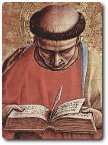Doctor Faustus Contents
- The Faust figure in European culture
- Social / political context
- Religious / philosophical context
- The theatrical context
- The texts of Doctor Faustus
- Prologue: Chorus one
- Scene one
- Scene two
- Scene three
- Scene four
- Scene five
- Chorus two
- Scene six
- Scene six, version B
- Scene seven
- Scene seven, version B
- Scene eight
- Scene eight, version B
- Chorus three
- Scene nine
- Scene nine, version B
- Scene ten
- Scene eleven
- Chorus four
- Scene twelve
- Scene thirteen
- Epilogue
Scene seven
Synopsis of scene 7
.jpg) Faustus describes to Mephastophilis the journeys he has made through Germany, France and Italy and the places he has seen. They are now in Rome to observe the Pope himself at close hand. Faustus asks Mephastophilis to make him invisible to those in the Pope's chambers, and is then able to trick and tease the clerics with clownish antics. A group of friars attempt to rid the Pope of the ‘demon' with a ceremony to curse a ghost/devil, but with a spectacular lack of success.
Faustus describes to Mephastophilis the journeys he has made through Germany, France and Italy and the places he has seen. They are now in Rome to observe the Pope himself at close hand. Faustus asks Mephastophilis to make him invisible to those in the Pope's chambers, and is then able to trick and tease the clerics with clownish antics. A group of friars attempt to rid the Pope of the ‘demon' with a ceremony to curse a ghost/devil, but with a spectacular lack of success.
Commentary on scene 7
Trier A German city on the River Mosel.
environed round Bordered, or surrounded
Campania The area of Italy of which Naples is the principal city.
Maro's golden tomb The tomb of the Roman poet Publius Virgilius Maro, who was buried in Naples in 19 BCE.
sumptuous temple Possibly a reference to St Mark's basilica in Venice.
But tell me now, what resting place is this? An example of how indications of a scene change or other stage directions are often built into the dialogue of the play.
erst Previously
his Holiness The formal way of addressing the Pope.
privy chamber Audaciously, Faustus is to stay in the Pope's private rooms – although he will, of course, be invisible. This is another example of the play's anti-clericalism and anti-Catholicism.
within whose walls such store of ordinance are The castle amply stocked with a year's worth of weaponry suggests:
- The fabulous wealth of the city
- Its status as a military stronghold as well as a religious centre.
Besides the gates … brought from Africa This refers to an obelisk by St. Peter's Church in Rome. It was actually brought to the city by the emperor Caligula.
Styx … Acheron … Phlegethon These are three of the four rivers of Hades the ancient Greek underworld, often used as a synonym for Hell.
 bald pate Refers to the tonsure of monks and friars.
bald pate Refers to the tonsure of monks and friars.
summum bonum … is belly-cheer' Another satirical attack on the clergy whose summum bonum (highest good) should not be filling their stomachs.
Sound a sennet This stage direction is for a trumpet call.
an you spare If you eat sparingly.
purgatory In Catholic teaching, Purgatory is the state in which the souls of the deceased, which are not yet fit for Heaven, are purified by various means.
we shall be cursed with bell, book and candle – A reference to an act of excommunication, performed by higher clergy using a bell, the Bible and a church candle.
Anon you shall hear a hog grunt, a calf bleat, and an ass bray Faustus ridicules the friars' ceremony and the excommunication rite.
dirge A piece of music sung at a funeral.
Maledicat Dominus! The Lord curse him. The play's audience would be familiar from the Mass with the phrase Benedicat Dominus (the Lord bless him), of which this is an ironic inversion.
et omnes sancti And all the saints. The play's audience would be familiar with this phrase from the Mass
Investigating scene 7
- Compare this scene with the aspirations and emotions expressed by Faustus in earlier scenes
- To what extent has he fulfilled those ambitions?
- What do you learn about Faustus from the tricks he plays on the Pope and friars?
